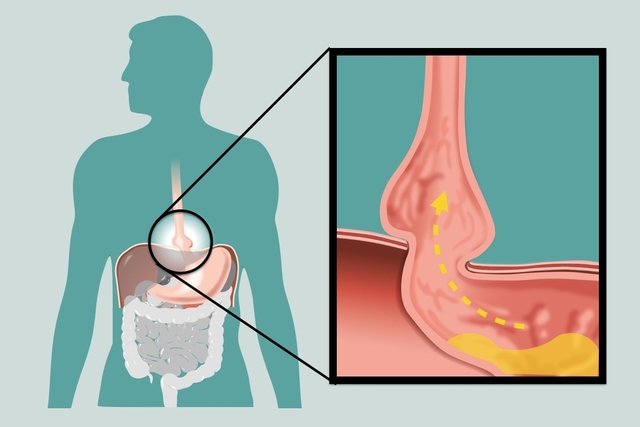The main symptoms of a hiatal hernia are a burning sensation in the throat and stomach, chest pain, the urge to vomit, frequent burping, difficulty swallowing and a persistent cough.
These symptoms occur due to the fact that a small portion of stomach tissue bulges into the hiatus, which is an opening in the diaphragm that should only contain the esophagus. Due to this bulging stomach tissue, gastric acid can backflow into the esophagus and cause irritation in the esophageal walls and other symptoms.
Also recommended: Hiatal Hernia: Symptoms, Surgery & Other Treatment Options tuasaude.com/en/hiatal-herniaHiatal hernia symptoms are quite uncomfortable and are more intense after meals, especially after consuming alcohol or fatty, spicy or fried food.

Main symptoms
The main symptoms of a hiatal hernia are:
- Burning sensation in the throat
- Heartburn or burning in the stomach
- Chest pain
- Urge to vomit
- Excessive burping
- Difficulty swallowing
- Persistent dry cough
- Bitter taste in the mouth
- Bad breath
- Reflux of food or drinks into the mouth
- Feeling of a very full stomach after meals
If you notice any signs or symptoms of a hiatal hernia, you should consult a gastroenterologist for further assessment.
Severe symptoms
Symptoms such as a fever, nausea, vomiting blood and very intense abdominal pain are considered to be more serious symptoms of a hiatal hernia. They may be signs of a strangulation of this hernia, which is characterized by reduced blood flow to the tissue surrounding the hernia.
Symptoms of a hiatal hernia can also be more severe due to direct and frequent contact of acidic stomach content with the esophageal wall. This can cause more local irritation and favor the appearance of very painful, bleeding ulcers.
Therefore, in the presence of these symptoms, you are advised to seek urgent medical attention for assessment and testing such as an X-rays and endoscopy.
How to relieve symptoms
The best way to relieve symptoms is to make some changes to the diet. You should avoid large meals and eliminate or reduce very fatty or spicy foods from your diet. You should also avoid lying down after eating and raise the head of the bed to sleep to prevent stomach contents from flowing up into the esophagus.
Also recommended: GERD Diet: What to Eat & Avoid for Acid Reflux tuasaude.com/en/gerd-dietIn some cases, the gastroenterologist may also prescribe gastroprotective medications, such as omeprazole or pantoprazole to protect the walls of the esophagus and relieve symptoms. In more serious cases, where symptoms do not improve with diet changes medication, surgery may be necessary to repair the hiatal hernia.
